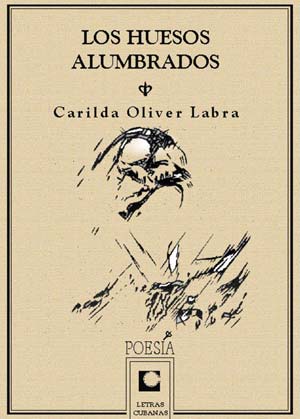4.1.3.3.5 “The Illuminated Bones”, 1988, by Carilda Oliver Labra (1922- )

A year before the publication of “Los huesos alumbrados,” Rafael Alcides had stated in the open letter he wrote to the poet: “Your poetry is like a cigarette: a vice I’ll never be able to cure. I acquired it very early. I always wanted a lot, I wanted more, I wanted everything, and in my eternal adolescence I dreamed of a violent love that seemed like a disaster, a cataclysm, a great catastrophe from the heavens—as happens in your poems.”
This sign continued to reign in the breath that runs through the poems included in this book, of revived eroticism but also from an elegiac tone, thus interweaving the eternal motifs of love and death in a song that oscillates between strength and helplessness, finding its seat in the lyrical word itself, sublimation of the very twists and turns of being through art.
However, the span of the poems extends through the pre-revolutionary years, for example the poem “Poesía”, one of the few of her production that captures an essentially metapoetic breath, is dated 1958, it perhaps holds the key to what has been for Carilda the sustained act of poetic creation, the surrender to this destiny beyond the very moved feeling that transpires in her verses:
“In this conspiracy of the traps,
of the tweezers;
in this empire of pustules,
in this round of thirst and whip,
help me.
I have nothing but your sword
and your consolation.
I have nothing but your sign and your freedom.
Come down to me for the others.”
In these verses, the topic of poverty and the social content that emerges as always through a moving love is reiterated, which sometimes takes on a hylozoic nature, especially towards the fragile things that surround her and what she fears, as the metaphorical mother of all creatures.
“Voz de la novia” is one of the poems in which the patriotic sentiment and revolutionary militancy of the Matanzas woman can be most clearly appreciated, without losing its polysemic nature and the density of nuances essential to poetry, in a certain way similar to the letter that Frank País dedicated to his girlfriend in a similar situation, these verses also have echoes of the renunciation of love of the Bayamo woman and in a broader sense, feminine patriotism but coupled with a high artistic expression:
“If time were not
worn out with shame,
if they had not been hanged at dusk,
if we weren’t there
in nineteen hundred and fifty-eight
in Cuba.
If the saw were not my own entrails,
I could
say that I love you.
(…)
If the moon weren’t trembling
of injustice,
If the bee’s eye did not duplicate the weapon,
I could say that I love you;
but the war has sounded
and all the pins are declared.
Do not touch me…
Taciturn Granada,
I will explode for the homeland.”
Here too he pays a lyrical tribute to the author of the simple verses in “Décima a Martí”, but above all he rescues him for the new historical juncture. This is a notebook that is both a hesitation and a harbinger of the future, in which death appears starkly but at the same time becomes a symbol of a new life, an image to which the title of “Los huesos alumbrados” (The Illuminated Bones) in a certain way refers.








